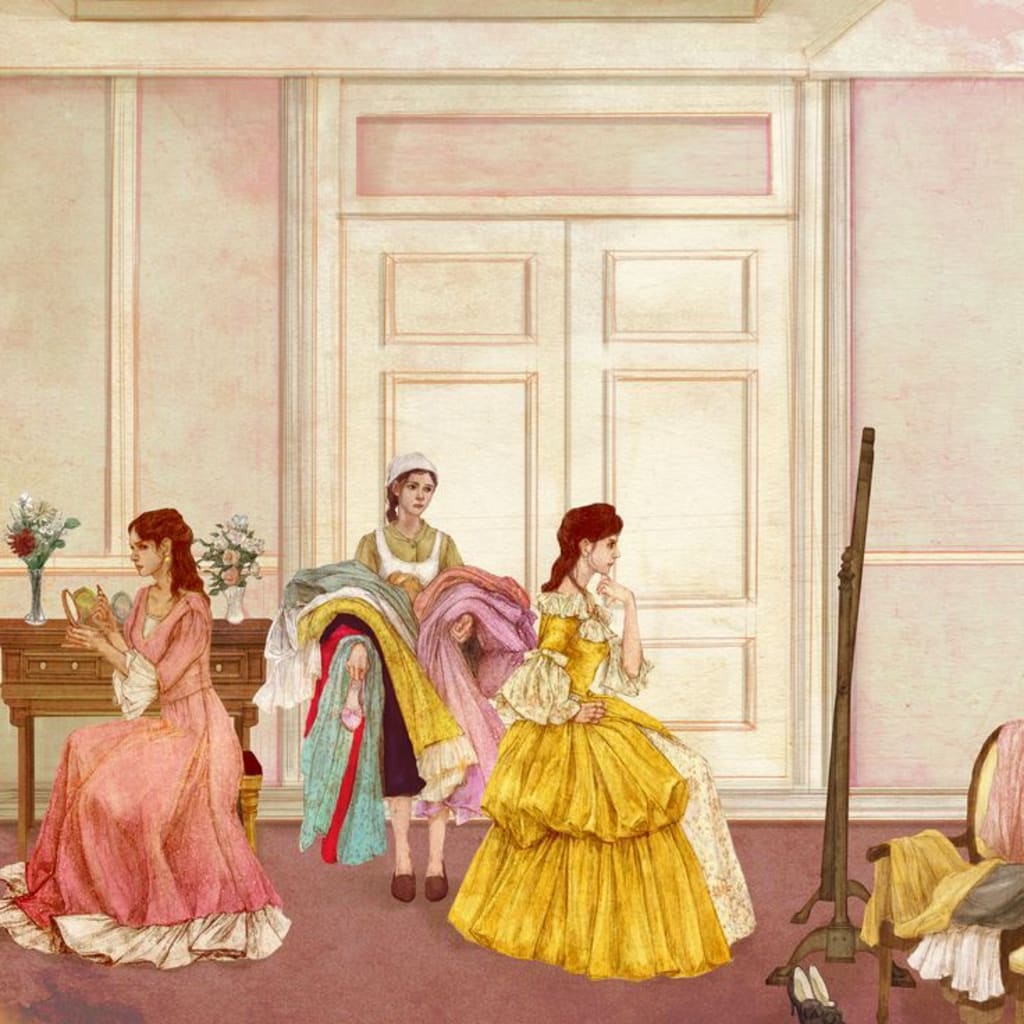The Misunderstood Stepsister
or How Cinderella Really Got the Glass Slipper

It begins with “Once upon a time.” No, that’s not right. In fact, this isn’t even a fairy tale. There are no glass slippers, pumpkins, or fairy godmothers. There are no beautiful girls with their gossamer blue gowns and perfectly coifed hair. Well, there are. But none of those things pertain to me.
Before I tell you what really happened in the story, I suppose I should introduce myself. My name is Lucinda, and I am one of what has become known as the ugly stepsisters. Storytellers have made me out to be hideous to look at. I have been called “mean,” and “wicked.” In the fancy books with the gilded covers and golden tipped pages I seek to destroy my stepsister’s life and have even chopped my own toes off for the sake of fame and fortune.
But the storytellers have it all wrong. And I am going to tell you what really happened.
My sister, Dorinda, and I were born in the same year, of the same month, at the same time. And being that we were twins, everyone expected us to be the same. But from the second we were born, we could not have been more different. I remember my nurse telling me that Dorinda was born first. And as she came out, she had her tiny red fingers wrapped around my ankle and was biting my toes with her toothless gums. That was the beginning of how the rest of our lives would be.
I was always slower than she was. I didn’t speak for the first three years of my life. Because I couldn’t tell you what I wanted, I resorted to using my hands and nonverbal voice to get the attention of anyone who would pay attention. This irritated my mother, who couldn’t be bothered to try and understand me. And it gave Dorinda the precise excuse she needed to prey upon me like a hawk. Anything Dorinda did that was wrong, I would be blamed for because I couldn’t tell the nursemaid, my mother, or anyone else she was lying. My mother grew so frustrated with me, that she gave me entirely over to the nursemaid and rarely would even look upon my face. My nurse taught me to speak and secretly educated me on how to read and write. She even taught me to play the lute, which I picked up quickly. I think it gave her joy to see me take pride in something I felt quite accomplished at.
I suppose I do not blame my mother for being the way she was. She came from a noble house that had fallen upon hard times. She married simply to keep her family from the debtor’s prison and not once ever uttered an expression of endearment for my father. When he died, she set about to squander what little money he had left at the time of his death and then set about to find a new husband. During that time, she dragged us further into debt as she held extravagant parties in the hopes of luring a new husband to her door. She would often parade Dorinda through the throngs of people, dressed in some excessive frock. But I, the rejected sister, the forgotten daughter, would sit at the top of the stairs and try to understand why I wasn’t included. Our neighbors knew of my existence, though my mother wished they didn’t. They would whisper in corners that I was “touched” or “mentally unsound.” They thought I couldn’t hear their unkind words, but I did. And their cruelty drove me to despair.
When I overheard my mother tell Dorinda she had accepted a proposal of marriage to a man that lived in another kingdom, I was elated. I thought that at last, I could find a fresh start in a new home with a new father. As we drove toward our new home, I thought about all the wonderful new possibilities my new life would hold. I had heard that my new stepfather had a daughter. That meant I would have a new sister, and maybe, just maybe, she would be kind to me.
When we arrived at our new home, I remember thinking it was quite like a castle. There was a great oak door and steps that wound their way down to the cobblestone driveway. At the top of the stairs stood a man and a young girl that seemed to be as tall as me. I hoped we would be the same age. I hoped even more that we would be friends. My mother introduced Dorinda with great pomp – bragging about how she was accomplished and beautiful. She said nothing of me.
The man, who was introduced as my new stepfather, turned to me and offered his hand. “And who are you, dear child?” he asked.
While I wanted to throw my arms around him for calling me a “dear child,” I instead shrank back against the carriage wheel. The horses moved and the carriage wheel rolled over the hem of my skirt, tearing it and exposing my petticoat. I stood there, unable to move, but mortified beyond comprehension.
“Lucinda!” My mother’s high-pitched voice sent the chickens in the yard scurrying for the hen house.
“That’s Lucinda,” Dorinda sneered. “She’s lazy, and not that smart.”
I looked down at my mud-covered shoes. I knew I was not lazy. I knew I was smarter than she was. But I could not seem to find the courage to speak up for myself.
The young girl, whom I assumed was my new step-sister, covered her perfect mouth her perfect hand and let out a dainty giggle. “Lazy Lucinda,” she whispered.
I looked up at her. She truly was perfect. From the top of her head to the bottom of her white silk shoes. But her words hurt me and crushed the hope of finding a new friend.
“Ella!” Her father grabbed her hand. “We do not make fun of our guests!” He knelt in front of me and once more offered his hand. “It is a pleasure to meet you, Lucinda.” He turned back to the young girl. “This is my daughter, Ella. Whom I believe owes you an apology.”
I was never sure if she was sorry for her words or not. Before she had the chance to speak, Dorinda grabbed her hand and dragged her toward the house, insisting on being shown her new room. My mother took my new stepfather’s arm and pulled him toward the house as well. I was left standing alone, once more wondering where my place was.
I soon discovered that it was in the forlorn tower room of the house. The other two rooms that were suitable for children were occupied by Ella and Dorinda. I do not think Ella liked Dorinda very much, but she doted on her father and therefore did her best to be a good step-sister. I spent most of my days in my room, playing my lute. While some might have felt a prisoner in the tower, I was glad to be left alone. The only person who ever came to hear me play was my step-father. I sensed a sadness in him, and believed it was because he had lost his first wife. In a way, we were one another’s consolation.
And then one day he did not come. Instead, my mother came flurrying through the door in hysterics. She screamed about an accident on the road and how she was now penniless once more. She turned her anger first towards me, smashing my lute against the wall and throwing all my belongings onto the floor. Ella and Dorinda rushed into the room. I could see that Ella had been crying. I felt a twinge of sympathy for her. Until that is, she opened her mouth.
“It’s your fault!” she screamed. “He went to buy you a new lute! That’s why he was on the road! It’s your fault he’s dead! I wish none of you had ever come here!”
My mother slapped Ella across the face. “How dare you speak to my daughter that way!”
I do not think my mother cared how I was spoken to. It was likely it simply made her feel better to hit something. She glared at Ella, who now had tears in her eyes, and then around the room. “Lucinda, gather your things. You will now move into Ella’s room.”
“But…” Ella stammered.
“Silence!” My mother snarled. She glared at Ella, and my step-sister shrunk back against the door. “Ella, you will now sleep here. And since we will now have to let the servants go, you will keep this house clean. You will make the food, tend to the animals, and clean the cinders from the fireplaces.”
Dorinda laughed. “Cinderella! Ha! Ha! Your name will now be Cinderella.”
Ella looked as though she had been betrayed. As I think about it, I should have said something to keep her from being made a servant in her own home or from having such a ridiculous name. But she had called me names, and, in that moment, I felt as though I was being vindicated. I gathered what my mother had not smashed and shut the door behind me, leaving Ella to her new life.
I could not understand it, but somehow, I had moved up in the pecking order of the house. Because I had lost my stepfather, my mother had decided that I was now better than Ella. I knew it was not fair, but I craved my mother’s attention. And what little I now received, I did so because Ella, Cinderella, was now treated as I had once been.
Years passed and the three of us became young women. Ella accepted her fate and did so with relative grace. I tried to be as kind to her as I could be. I did my best to clean when my mother and sister were not looking. I would leave food on my plate because I knew she would eat it before washing the dishes. When I could, I would sneak up to my old attic room and place candles on the table next to my old bed so that she did not need to sleep in the dark.
There were times of course when I had to pretend to hate her. I recall one time we had come home from the village and Ella had just scrubbed the floor. My mother and Dorinda tramped across it like a pair of oxen, but I stood in the doorway, wishing I could somehow float across the floor and not dirty it.
“Lucinda!” My mother called to me from the bottom of the stairs.
“Mother,” I mumbled. “The floor, Ella just cleaned it. I should take my shoes off…”
That was the last time I ever remember attempting to suggest an alternative action to my mother. I received a wooden rod across the palm of my hands for arguing with her that day. And the worst part of it was, I do not think Ella even knew.
There was also the time we were invited to the ball at the palace. To this day, I do not know why my mother thought that either my sister or I would be introduced to the prince. It was not as though we had been invited as honored guests. Every eligible girl in the kingdom had been asked and therefore we were certainly nothing special.
But my mother behaved as though it was our wedding day, or at least Dorinda’s. My mother had the tailor make a new gown for her and paid for it by bartering her wedding ring. I was permitted to wear what would have been Dorinda’s best dress, save for the fact that she now had a new one. I begged my mother to not make me go. I was horrified of large groups of people. There was too much noise, to many variables pertaining to what could go wrong. But she insisted that I go in case the prince liked “dimwitted girls.”
Even as I dressed, I could not understand why the prince would look twice at someone like me. I suppose I was better off than Ella who wanted to go to the ball but was forbidden to do so. She attempted to make a new gown out of one of her mother’s old gowns but was foolish enough to ask my mother if she could go because she had something to wear. My mother and Dorinda destroyed her dress, before dragging me out to the carriage. As I looked in the window, I saw Ella draped over a large pumpkin with her head buried in her hands.
I spent most of the evening wandering the quiet halls of the palace. Dorinda and my mother shamelessly sipped wine and threw themselves at any man that would look twice at them. They never met the prince, nor anyone of consequence. Instead, they provided much entertainment for those in the kingdom who wished to turn their noses up and scoff at the fools they made of themselves that night.
But someone else DID meet the prince that night. I will never forget walking around a corner in the palace garden only to run into Ella. Except, she was not the Ella I was familiar with. Instead of tattered clothes, she wore a beautiful blue gown. Her hair was clean and glossy, much like the day it was when I met her. She looked at me breathlessly for a moment and I think she was stunned to see me there.
Trying to end the awkward moment, she fumbled with her skirt and then lifted it to look at her feet. I noticed that she had glass slippers on her feet. They were so delicately designed, with marvelous etchings and glass bows on the point of each shoe. One of the shoes had fallen off her foot and lay sparkling in the grass. She bent down to put it back on, but I stopped her.
“Let me.” I reached down to put the shoe back on. As I picked it up, the glass bow fell off the shoe. I froze. Would she be angry? I looked up at Ella, almost anticipating her anger. “I’m sorry…”
Instead of yelling, Ella smiled. She took the show out of my hand. “It’s quite all right, Lucinda. These shoes are a bit too large in the first place.” She slipped the shoe back on her foot. Somewhere in the palace a clock chimed and startled her. “I have to go!” she gasped.
“Wait a minute!” I held up the glass bow. “What about this?”
Ella turned. I sensed she wanted to say more, but voices could be heard in the garden and the clock chimed once more. “Keep it,” she replied and rushed away.
From behind me, the voices grew louder, and I turned to see a flurry of armed guards rush passed me. In their haste, they knocked me to the ground. When I managed to stand once more, I was looking directly into the eyes of the prince. He bent over, and at first, I thought he was bowing. My face became flushed. How, after an evening of avoiding people, had I managed to be in the presence of the prince himself.
“No need to bow to me, your majesty,” I stammered.
The prince righted himself and I noticed that he now held the glass bow from the slipper in his hand. My flushed cheeks must have become redder. Of course, he had not bowed to me, he was retrieving the bow from the grass.
He looked at me eagerly. “Did you see a young woman pass by here?”
I nodded and pointed down the long row of trees. “She went that way.”
The prince smiled and turned to follow Ella. “Thank you, my lady!”
“Excuse me,” he turned at my request. I looked at the bow in his hands. “Might I… could I please have that?”
I suppose the prince was in too much of a hurry to argue. He grabbed my hand, dropped the bow into my palm and fled after Ella. Gripping the bow, I turned and walked back toward the palace as the clock struck midnight. Ella and I had never been close, but I believe there, in the garden, she had wanted to be. Perhaps in those few seconds, we were truly sisters.
When Mother found out that Ella had gone to the ball, she locked her in her room. She insisted that it was punishment and had nothing to do with the fact that the entire kingdom was looking for a mysterious girl that had entranced the prince. When he showed up at our door with one of Ella’s class slippers, Mother tried desperately to fit the shoe first on her own foot and then Dorinda’s. She pushed Dorinda’s toes back so far that she broke two of them. Dorinda howled and screamed. In the chaos, I made eye contact with the prince. He recognized me and smiled. With a nod of my head, I gestured toward the stairs that would lead to Ella’s room. I watched as the prince scooped up the slipper and bounded up the stairs and then turned and walked out into the garden. I sat quietly under the shade of a tree and listened as my sister and mother were dragged away for mistreating Ella, who I assumed would now become Princess Ella. After the horses and carriage had driven off, I was left, quite contentedly, in complete and total silence.
My assumption was correct. Ella did become a princess. I suppose it was to be expected for someone like her to become a princess. My mother and sister were sent away, and I am quite happy to say that I never heard from them again. Ella and I spoke from time to time and our conversations healed the wounds our words and actions had created. She and the prince gave me the house and saw to it that I lived quite comfortably. I went to the the palace often to play for the court and was never shut away or ignored again. When I was alone, as I quite preferred to be, I took take a small box out of the pocket in my dress. I would open it and gaze at the glass bow from the glass slipper that Ella had given me. To anyone else, it would have seemed trivial. But to me, it was a symbol of an unlikely bond between unlikely sisters. And in that sense, I suppose that I did live quite happily ever after.
So, you see, dear reader, you have been misinformed. I am not the wicked stepsister, I am the misunderstood stepsister. And let this realization be a lesson to you. For not all is as it seems in the pages of what you call fairy tales. Sometimes the heroine is not as perfect as you have been told. And sometimes, though not always, the villain is not as evil as previously believed. So, when you want to judge someone because they are different, remember the old, wise phrase: “Don’t judge a book (or fairytale) by its cover.”
About the Creator
Reader insights
Nice work
Very well written. Keep up the good work!
Top insights
Compelling and original writing
Creative use of language & vocab
Easy to read and follow
Well-structured & engaging content
Excellent storytelling
Original narrative & well developed characters







Comments (2)
I enjoyed your retelling from a different perspective—this was a fun read.
Great story! I wasn't sure what to expect going into a "misunderstood villain" story, but it was a really original, fresh take on the idea!